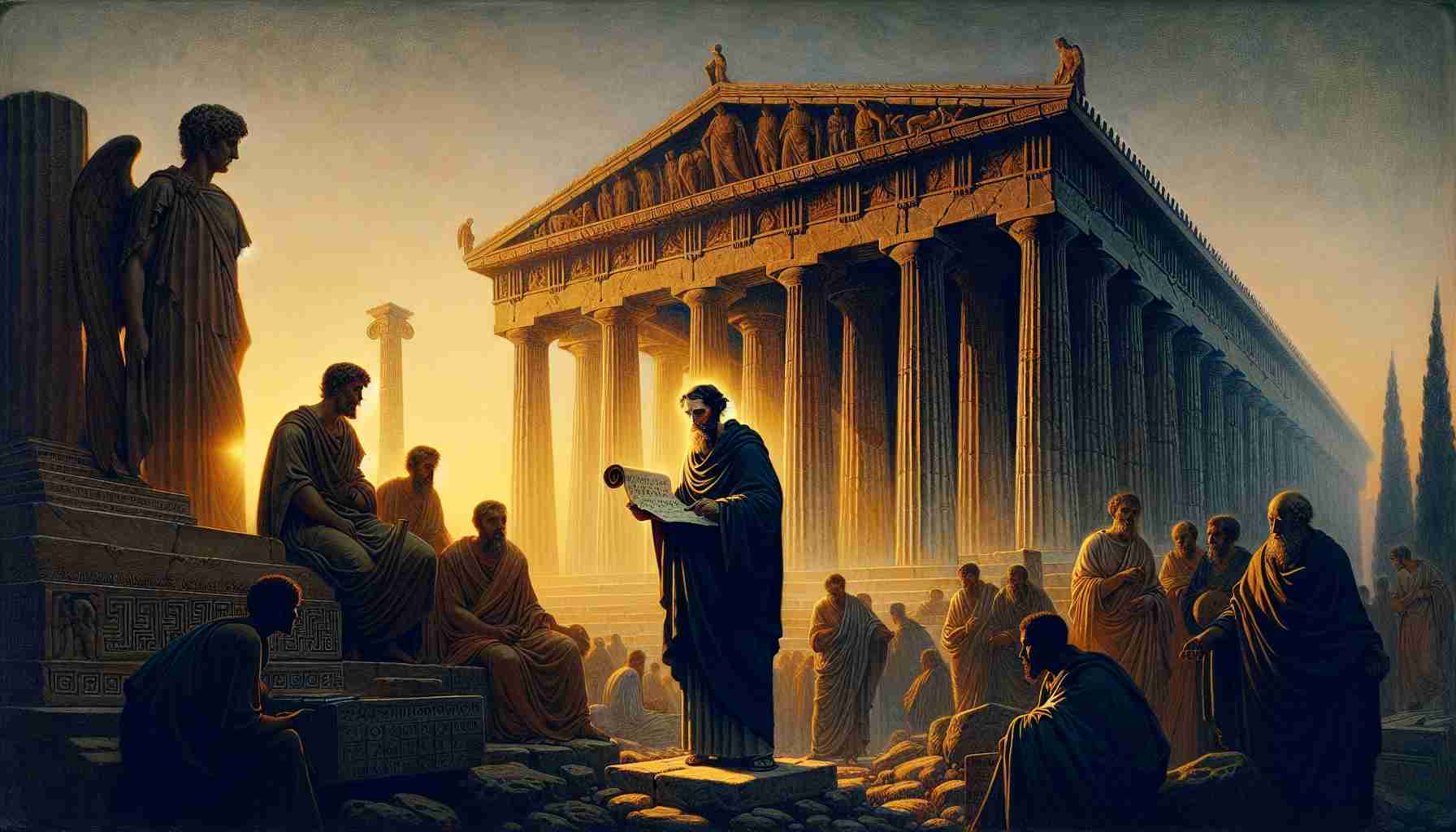

The marketplace in Athens smelled of olives and smoke. Statues watched from every archway—silent gods carved in marble. Aristos moved among the stalls, weaving past philosophers debating near the Painted Porch, his scroll satchel heavy on one shoulder. He was a stonecutter’s apprentice, son of Melanion the mason, but his dreams were larger than buildings. Ever since his sister died—the fever stealing her in a night—Aristos had wandered through voices and idols, chasing any thread of meaning.
Today, he followed the murmurs of a crowd gathering on the Hill of Ares.
A man stood in their midst, dark-robed and weathered, speaking in a foreign accent. Not of Athenian pedigree, not trained in the Academies. And yet, his voice held gravity.
“You worship what you do not know,” the man said, arms open to the sprawling city behind him. “I proclaim to you the Unknown God.”
Aristos blinked. His fingers tightened around the edge of his scroll. He knew that altar—the nameless one, nestled between shrines of marble and gold. Pilgrims offered incense there as a hedge, a desperate insurance against divine offense. But now, this man claimed to know that faceless God.
“He does not live in temples made by hands,” the foreigner continued. “He is not served as though He needed anything. He gives life and breath to all.”
Laughter rose from the stoics nearby. Someone scoffed, “Another wandering fool with mystical riddles.”
But Aristos couldn’t look away. Not yet. The man’s words stirred something—something deeper than the rituals Aristos had long followed without faith.
“When we were astray,” the man added, gentler now, “God overlooked our ignorance. But now He calls all to repent. For He has appointed a day of justice—and raised a man from the dead to prove it.”
A crack, and the crowd fractured like pottery under strain. Some dismissed him outright. Others jeered.
Raised from the dead?
Aristos stood frozen. He thought of his sister’s lifeless face. Of his mother’s silence since. Of the gnawing emptiness. If anyone could conquer death…
As the man turned to leave, Aristos stepped forward.
“Wait!”
The preacher stopped. His eyes landed on Aristos.
“I—I want to know about this God,” Aristos said, chest tight. “Not shadows. Not idols. Him.”
The man nodded. “Then walk with me—and I will tell you about Jesus.”
Aristos followed, legs trembling. They sat beneath an olive tree, away from the noise. And the man—Paul—spoke with fire and tenderness. Of a Creator who saw each soul. Of One who entered this world of dust, suffered, forgave, and walked out of death itself.
Aristos wept when he finally believed it.
That night, under a moonlit sky, Aristos whispered the name of Jesus aloud. Not as a theory. Not as a philosopher’s idea. But as a man reaching toward a God who had already reached for him.
He rose the next morning not as a seeker, but a son. And Athens, once a city of idols, now bore one true altar—in his newly awakened heart.
The marketplace in Athens smelled of olives and smoke. Statues watched from every archway—silent gods carved in marble. Aristos moved among the stalls, weaving past philosophers debating near the Painted Porch, his scroll satchel heavy on one shoulder. He was a stonecutter’s apprentice, son of Melanion the mason, but his dreams were larger than buildings. Ever since his sister died—the fever stealing her in a night—Aristos had wandered through voices and idols, chasing any thread of meaning.
Today, he followed the murmurs of a crowd gathering on the Hill of Ares.
A man stood in their midst, dark-robed and weathered, speaking in a foreign accent. Not of Athenian pedigree, not trained in the Academies. And yet, his voice held gravity.
“You worship what you do not know,” the man said, arms open to the sprawling city behind him. “I proclaim to you the Unknown God.”
Aristos blinked. His fingers tightened around the edge of his scroll. He knew that altar—the nameless one, nestled between shrines of marble and gold. Pilgrims offered incense there as a hedge, a desperate insurance against divine offense. But now, this man claimed to know that faceless God.
“He does not live in temples made by hands,” the foreigner continued. “He is not served as though He needed anything. He gives life and breath to all.”
Laughter rose from the stoics nearby. Someone scoffed, “Another wandering fool with mystical riddles.”
But Aristos couldn’t look away. Not yet. The man’s words stirred something—something deeper than the rituals Aristos had long followed without faith.
“When we were astray,” the man added, gentler now, “God overlooked our ignorance. But now He calls all to repent. For He has appointed a day of justice—and raised a man from the dead to prove it.”
A crack, and the crowd fractured like pottery under strain. Some dismissed him outright. Others jeered.
Raised from the dead?
Aristos stood frozen. He thought of his sister’s lifeless face. Of his mother’s silence since. Of the gnawing emptiness. If anyone could conquer death…
As the man turned to leave, Aristos stepped forward.
“Wait!”
The preacher stopped. His eyes landed on Aristos.
“I—I want to know about this God,” Aristos said, chest tight. “Not shadows. Not idols. Him.”
The man nodded. “Then walk with me—and I will tell you about Jesus.”
Aristos followed, legs trembling. They sat beneath an olive tree, away from the noise. And the man—Paul—spoke with fire and tenderness. Of a Creator who saw each soul. Of One who entered this world of dust, suffered, forgave, and walked out of death itself.
Aristos wept when he finally believed it.
That night, under a moonlit sky, Aristos whispered the name of Jesus aloud. Not as a theory. Not as a philosopher’s idea. But as a man reaching toward a God who had already reached for him.
He rose the next morning not as a seeker, but a son. And Athens, once a city of idols, now bore one true altar—in his newly awakened heart.